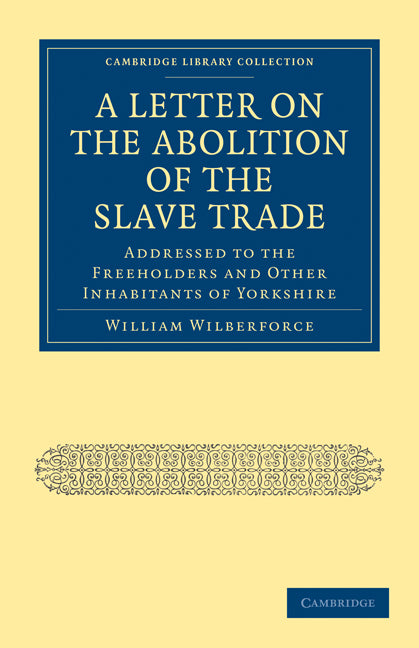Freshly Printed - allow 8 days lead
Couldn't load pickup availability
A Letter on the Abolition of the Slave Trade
Addressed to the Freeholders and Other Inhabitants of Yorkshire
This 1807 'letter', addressed to his constituents, summarises Wilberforce's arguments for the abolition of the slave trade.
William Wilberforce (Author)
9781108024990, Cambridge University Press
Paperback / softback, published 27 January 2011
498 pages
21.6 x 14 x 2.8 cm, 0.63 kg
William Wilberforce (1759–1833) was a politician, philanthropist and evangelical Christian, now best known for his work to end the slave trade. Elected to Parliament in 1780, he campaigned unsuccessfully for penal and electoral reform. In 1787, at the encouragement of William Pitt, he took up the cause of abolition at Westminster, but humanitarian and ethical arguments were slow to overcome the economic interests of those who had made fortunes from the slave trade or the use of slave labour. It was not until 1807 that the Abolition Bill was finally passed: shortly beforehand, Wilberforce had published this Letter to his constituents, justifying his preoccupation with abolition against claims that he was neglecting their local interests at Westminster, and setting out all his arguments against the slave trade. It is followed by his 1814 letter to Talleyrand, calling for a Europe-wide ban of the trade.
Introduction
1. Sources of information
2. Methods by which the slaves are supplied in Africa
3. Slave trade's effects in the interior and on the coast
4. Proof of abolitionists' facts decisive, and contrary allegations groundless
5. Plea against abolition, that Negroes are an inferior race
6. Opponents' description of Negro character contrasted with other accounts
7. Argument from Africa's never having been civilized, considered
8. New phaenomenon - interior of Africa more civilized than coast
9. Plea of opponents, that slaves state in Africa extremely miserable
10. Plea from cruelty of African despots
11. Ditto, that refused slaves would be massacred in case of abolition
12. Middle passage
13. Opponents' grand objection - that stock of slaves cannot be kept up in West Indies without importations
14. Presumptive arguments against the above allegation, from universal experience
15. Positive proof that the stock of slaves might be kept up without importations - argument stated
1. Abuses sufficient to account for great decrease
2. Yet, though abuses so great, the decrease quite inconsiderable
3. Hence, abuses being corrected, slaves would rapidly increase
Appendix
Letter to His Excellency the Prince of Talleyrand Perigord on the subject of the slave trade (1814).
Subject Areas: Early modern history: c 1450/1500 to c 1700 [HBLH]


